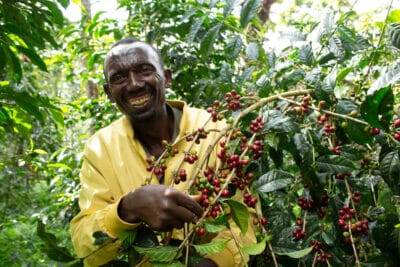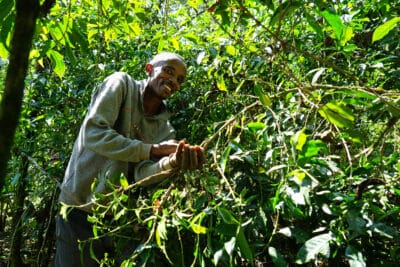Stories
Ethiopia
25 August 2023
Sihen’s shift to urban agriculture
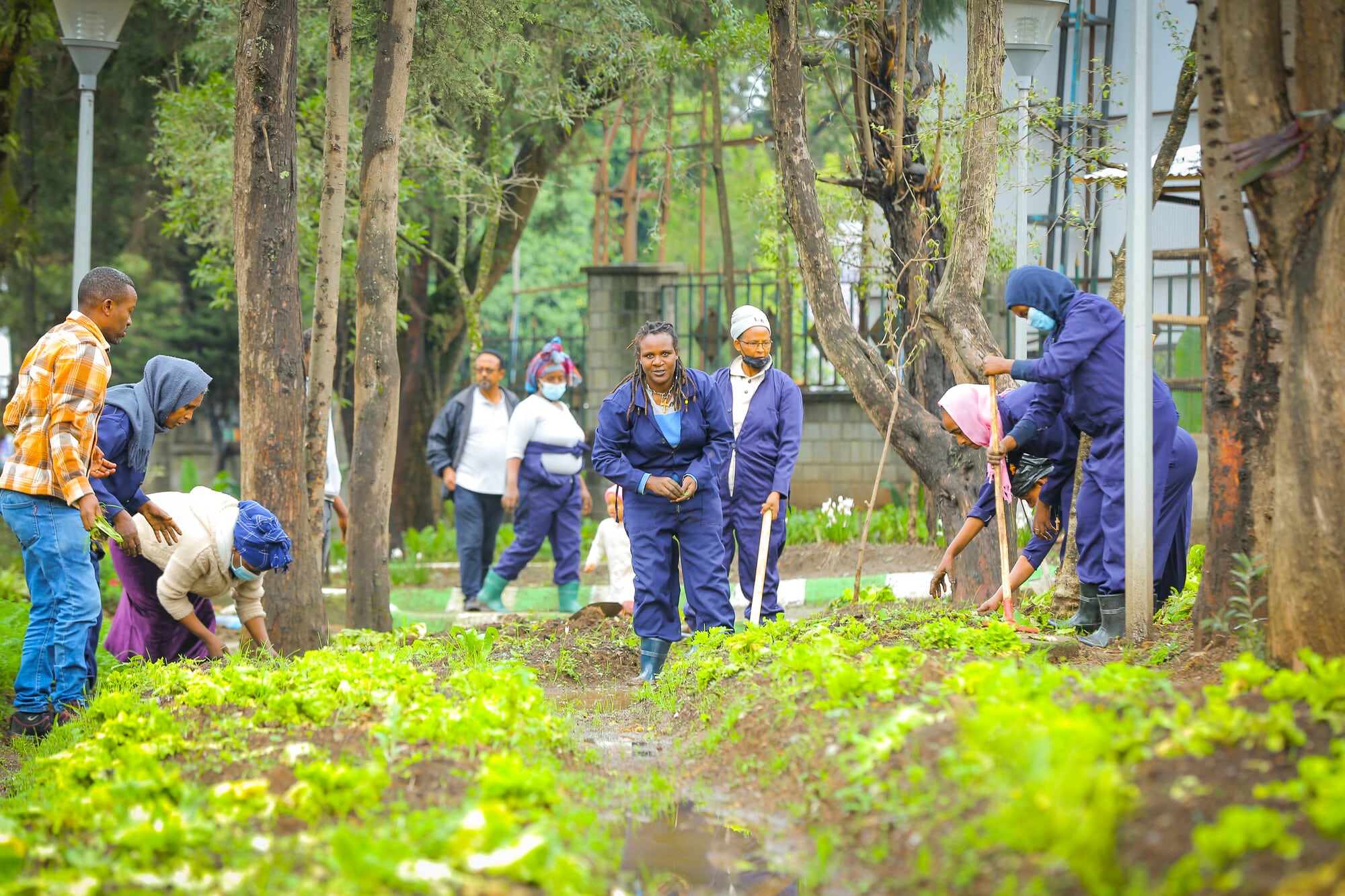
Growing plants has been Sihen Tsigie’s passion since childhood, when her older sister taught her about flowers. She enjoys seeing her neighbourhood in Gullele Sub-city in Addis Ababa, Ethiopia, surrounded by greenery, so much so that Sihen has surrounded her house with a variety of flowers.
Although she has always grown flowers as a hobby, Sihen had never thought of growing nutrition dense vegetables or herbs until she joined Farm Africa’s Urban Agriculture pilot project in Addis Ababa.
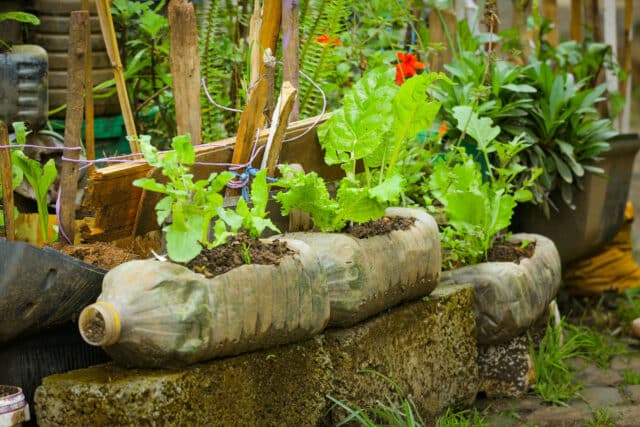
With funding from the Swedish International Development Agency (SIDA), the project is being implemented by Farm Africa in collaboration with Ethiopia’s Ministry of Planning and Development, Addis Ababa urban agriculture office, Addis Ababa infrastructure and urban development office and Addis Ababa youth and sport office.
The project, which launched nine months ago, aims to improve the livelihoods, nutrition and food security of low-income urban households, and promotes urban beautification while protecting the environment.
For Sihen, the project is improving her skill, hobby and lifestyle. She is growing vegetables and herbs for her own consumption and has joined Menen VSLA, one of seven village saving and loan associations that the project helped to set up. Thanks to the sale of vegetables and herbs, the VSLA has saved 5,000 Ethiopian Birr (79 GBP).

“I had never thought of this before. I would say it’s due to lack of awareness. Though I get to know many people, I was not well aware of producing vegetables for my own consumption,” said Sihen.
“Providing me with seedlings, the project team advised me to grow my own vegetables at home. That is how I started producing for my household consumption.”
Over the last nine months, Sihen, together with 105 other people taking part in the project, has been trained in urban agriculture and is applying the practices on demonstration plots in the premises of the Federal Ministry of Planning and Development.
The training also covers vegetable production, poultry, fish farming, compost preparation, as well as village saving and loan associations (VSLAs) and marketing and customer relation skills.
Experts have provided technical support on how to use limited resources efficiently including land and water, crop and organic fertiliser selection and techniques in land preparation, planting, harvesting and post-production handlings.
The project is also working with the community on how to enhance income from petty trades and is facilitating connections to agricultural input suppliers and market linkages for their products.
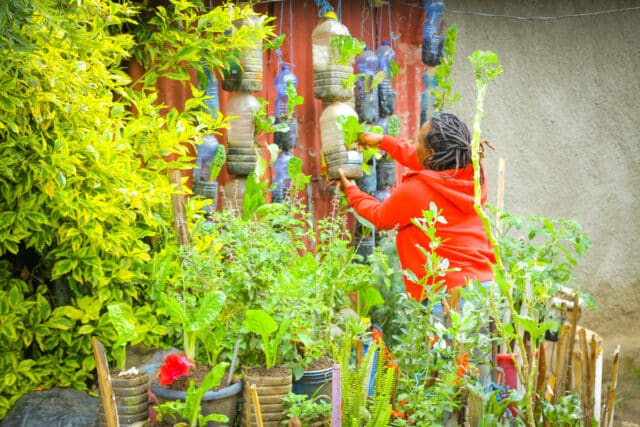
Following the training, Sihen started applying knowledge gained from theoretical and practical exercises. She plants vegetables using vertical structure materials she received from the project, grows herbs and prepares compost at her house.
She made the best use of her limited space by adding interesting touches and creatively redesigning plastic water bottles and buckets, hanging them against the wall of her house, all in accordance with professional advice.
Now, her house is surrounded by a variety of vegetables and herbs including lettuce, beetroot, collard greens, carrots, Swiss chard and mint.
Sihen explains the difference of growing your own food: “I have harvested and eaten lettuce and Swiss chard more than five times.”
"It’s really great to grow your food. There is a big difference between vegetables from the market and from your yard, it’s fresh and tasty. Above all, you feel confident enough to eat, as you grow it clean and organic."

Sihen Tsigie
Participant, Urban Agriculture project
In the case of pests, the project recommends farmers avoid using chemicals as much as possible. Instead, they are encouraged to treat and keep plants healthy, spraying a natural fluid prepared from a combination of garlic, ginger, pepper powder and salt. It is only in rare cases that pesticides are applied.
Sihen believes in the importance of growing organic vegetables, “I have never applied chemicals to kill pests. In accordance with the knowledge I gained, I use homemade pesticides, mixing and extracting hot pepper powder, garlic, ginger and salt. I try to avoid pesticides as much as possible.”

Sihen is also helping her neighbours and close friends grow their own vegetables: “I have demonstrated the benefit to my friends practically by sharing harvested vegetables with them. I have told many people and am happy one of my neighbours is following in my footsteps.”
She continues: “I gained much knowledge including compost preparation and usage. Prior to the training, I had no idea even about the term compost. But now, I am able to compost by myself.”
"The most important thing is I invite others to try what I have done, giving seedlings and compost, hoping to see them producing their own food."

Sihen Tsigie
Participant, Urban Agriculture project
“Though my sister doesn’t have enough space to grow vegetables, I have a plan to make her plastic pots that she can use vertically,” said Sihen.
Wegayehu Tadesse, who lives in the same kebele as Sihen, is also taking part in the project. Over recent years, both women have contributed to the cleanliness of their environment, nurturing nature in their own ways.

Like Sihen, Wegayehu also enjoys gardening, although she has typically grown a variety of flowers, vegetables and herbs.
Wegayehu says, “We have been doing it traditionally. For instance, it was only during rainy seasons, in June, that we used to plant nurseries. But, now, attending a couple of trainings by the project, we have gained deep knowledge on the details like timing, spacing and compost preparation.”
Wegayehu concludes, “I am happy my family is having a healthy feeding habit: we grow our vegetables near us and cook whenever we would like to eat. We get fresh vegetables.”

